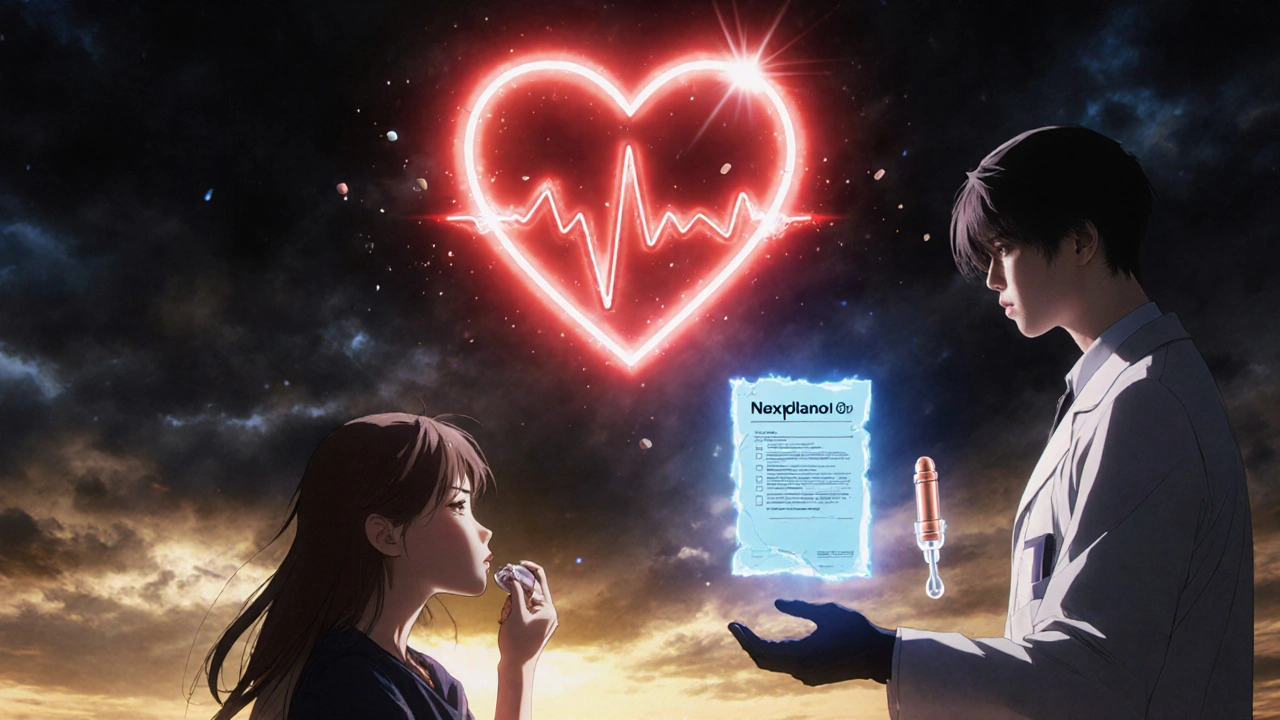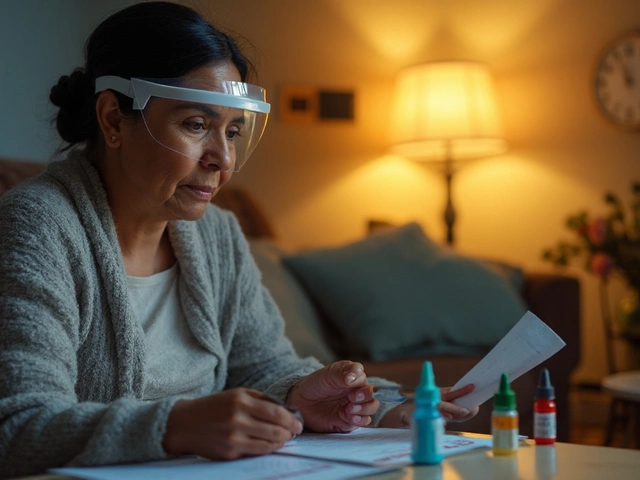More than 8 million women in the U.S. between the ages of 18 and 39 take antidepressants. At the same time, about 65% of women in that age group use some form of birth control. For many, these two medications aren’t optional-they’re essential. But what happens when you take them together? Can one make the other less effective? Could it make side effects worse? These aren’t theoretical questions. They’re daily realities for millions of women managing both mental health and reproductive health at the same time.
Most Antidepressants Don’t Break Birth Control
The good news? For most women, taking antidepressants and hormonal birth control together is safe. The most commonly prescribed antidepressants-SSRIs like sertraline (Zoloft), escitalopram (Lexapro), and fluoxetine (Prozac)-don’t interfere with how birth control works. Multiple studies, including a 2024 review of 15 clinical trials involving over 3,800 women, found no meaningful drop in contraceptive effectiveness when these antidepressants were taken with combined oral pills, patches, or rings.One study tracked 232 women on fluoxetine and birth control. Their depression scores didn’t change, and their birth control worked just as well as in women taking placebo. Unintended pregnancy rates were nearly identical: 0.9% in the antidepressant group versus 0% in the control group. That difference wasn’t statistically significant. In other words, your birth control isn’t likely to fail because you’re taking Lexapro or Zoloft.
Even the progestin-only methods-mini-pills, implants like Nexplanon, and IUDs like Mirena-show almost no interaction with SSRIs. That’s partly because they don’t contain estrogen, which can sometimes affect how the liver processes drugs. So if you’ve been told to avoid estrogen-based birth control because of mood concerns, you still have safe, effective options.
The Real Risk: Tricyclic Antidepressants
Not all antidepressants are created equal. Tricyclics like amitriptyline (Elavil), nortriptyline, and imipramine are older medications that can cause serious issues when mixed with hormonal birth control. The problem isn’t that birth control stops working-it’s that birth control can make the antidepressant too strong.Oral contraceptives slow down the liver’s ability to break down tricyclics by inhibiting enzymes called CYP1A2 and CYP2C19. This can raise blood levels of the antidepressant by 30% to 50%. For some women, that means dizziness, dry mouth, or blurred vision. For others, it can lead to dangerous heart rhythm changes, including QT prolongation. A 2019 study found this side effect occurred in 12% of women taking TCAs with birth control.
If you’re on amitriptyline and birth control, your doctor should check your heart rhythm with an ECG and monitor your blood levels. Many providers now switch patients from TCAs to SSRIs when they start hormonal contraception-not because SSRIs are always better, but because they’re far safer in this combination.
What About Bupropion (Wellbutrin)?
Bupropion is different from SSRIs. It doesn’t raise serotonin levels-it affects dopamine and norepinephrine. That makes it a popular choice for women who struggle with sexual side effects from other antidepressants. The good news? Bupropion doesn’t interfere with birth control. Studies show less than a 5% change in estrogen levels when taken together. That’s practically negligible.And here’s another reason it’s often recommended: sexual side effects. SSRIs cause reduced libido, trouble reaching orgasm, or vaginal dryness in 30% to 70% of users. Hormonal birth control can add to that-15% to 25% of women on the pill report lower sexual desire. When you combine them, the effect can be compounded. A 2022 survey of over 1,200 women found that 41% of those on both medications reported worsened sexual function. For many, switching to bupropion was the turning point. One woman on Reddit wrote: “Switched from Zoloft to Wellbutrin. My sex drive came back. My mood stayed stable. I didn’t need to change my IUD.”

Birth Control Methods Compared
Not all birth control is the same when it comes to interactions. Here’s how the main types stack up:| Birth Control Type | Interaction Risk with SSRIs | Interaction Risk with TCAs | Notes |
|---|---|---|---|
| Combined Oral Pill (estrogen + progestin) | Very Low | High | May raise TCA levels by 30-50% |
| Progestin-Only Pill (mini-pill) | Very Low | Low | No estrogen = less enzyme interference |
| Implant (Nexplanon) | Very Low | Low | Stable hormone levels, no daily pill to miss |
| Copper IUD (non-hormonal) | None | None | Best option if sexual side effects are a concern |
| Hormonal IUD (Mirena, Kyleena) | Very Low | Low | Local delivery = minimal systemic effect |
If you’re worried about side effects or interactions, the copper IUD is the safest bet. It doesn’t interact with any antidepressant. It’s also the most effective form of birth control available-over 99% effective-and lasts up to 12 years. Many women who’ve had bad reactions to hormonal methods find relief with it.
What About Other Medications?
It’s not just antidepressants you need to watch. Some antibiotics can seriously reduce birth control effectiveness. Rifampin, used to treat tuberculosis, cuts estrogen levels by up to 60%. If you’re prescribed this drug, you need backup contraception for at least a month after finishing it.But don’t panic about common antibiotics like amoxicillin or azithromycin. Multiple studies and clinical guidelines confirm they don’t interfere with birth control. The myth that all antibiotics weaken the pill persists, but it’s not true.
Even some supplements can matter. St. John’s Wort, often used for mild depression, is a strong enzyme inducer. It can drop birth control hormone levels enough to cause ovulation. If you’re taking it, stop. Talk to your doctor about alternatives.
When to Call Your Doctor
Most women won’t have problems. But you should reach out if you notice:- Breakthrough bleeding that’s new or heavier than usual
- Worsening depression or anxiety after starting or changing medications
- Signs of heart rhythm issues: dizziness, fainting, rapid heartbeat, chest pain
- Sharp drop in sexual desire or persistent vaginal dryness
- Unexplained nausea, headaches, or swelling
These aren’t always signs of interaction-but they’re signals your body is responding to something. Don’t wait. Your provider may need to adjust your antidepressant, switch your birth control, or run a blood test.
What Your Doctor Should Do
Good care means more than just writing two prescriptions. Your provider should:- Ask about your birth control method before prescribing an antidepressant
- Review your full medication list-including supplements and OTC drugs
- Check liver function before starting TCAs
- Monitor mood and menstrual patterns at your first follow-up (usually 4 weeks)
- Discuss sexual side effects openly-don’t wait for you to bring it up
Many private practices still don’t do this. But systems like Kaiser Permanente started using automated alerts in 2021 to flag potential interactions. That’s the standard we should all expect.
What You Can Do Right Now
You don’t need to wait for your next appointment to take control:- Know what you’re taking. Write down the names and doses of your antidepressant and birth control.
- Look up your specific combination. Search “sertraline and birth control interaction” or “Lexapro and Mirena” for studies and guidelines.
- Track your symptoms. Use a simple journal: mood, bleeding, libido, sleep. Even a notes app works.
- Ask your pharmacist. They see interactions daily. Ask: “Is this combo safe? Should I space them out?”
- Don’t stop either medication without talking to your doctor. Stopping antidepressants suddenly can cause withdrawal. Stopping birth control can lead to unplanned pregnancy.
Many women feel guilty or embarrassed asking about sex or mood side effects. But this isn’t about being “too sensitive.” It’s about your health. If your doctor brushes you off, find another one. You deserve care that respects both your mental and reproductive needs.
What’s Next?
Researchers are now studying how your genes affect these interactions. Some people have a slower version of the CYP2D6 enzyme, which means they process SSRIs differently. Others have CYP2C19 variants that make them extra sensitive to TCAs. A $2.4 million study launched in late 2024 is tracking how these genetic differences impact women on both medications. In the next few years, we may see personalized dosing based on DNA.For now, the message is clear: You can safely take antidepressants and birth control together-most of the time. But you need to be informed. Not every antidepressant is safe with every birth control. Not every side effect is “just in your head.” And you don’t have to choose between mental health and reproductive control. With the right info and the right provider, you can have both.
Can antidepressants make birth control less effective?
For most commonly prescribed antidepressants like SSRIs (sertraline, escitalopram, fluoxetine) and bupropion, no-they don’t reduce birth control effectiveness. Studies show no significant drop in hormone levels or increase in pregnancy rates. The only exception is tricyclic antidepressants (like amitriptyline), which can build up in your system when taken with birth control, but this doesn’t make birth control fail-it increases the risk of antidepressant side effects.
Does birth control make depression worse?
For some women, yes. Hormonal birth control can cause or worsen mood symptoms, especially in those with a history of depression or PMDD. But it doesn’t happen to everyone. If you notice increased sadness, irritability, or anxiety after starting the pill, patch, or ring, talk to your doctor. Switching to a different hormone type or trying a non-hormonal method like the copper IUD can help.
Is it safe to take Lexapro with birth control?
Yes. Lexapro (escitalopram) has no clinically significant interaction with any form of hormonal birth control, including pills, patches, rings, implants, or IUDs. The FDA-approved prescribing information for Lexapro states no dose adjustment is needed when taken with oral contraceptives. Multiple studies confirm that women taking Lexapro and birth control together have the same depression treatment outcomes and pregnancy prevention rates as those taking either medication alone.
Why do I feel worse sexually on both medications?
SSRIs cause sexual side effects-like low libido, trouble climaxing, or vaginal dryness-in 30% to 70% of users. Hormonal birth control can lower sexual desire in 15% to 25% of women. When taken together, these effects can add up. A 2022 survey found 41% of women on both medications reported worsened sexual function. If this is happening, talk to your doctor about switching to bupropion (Wellbutrin), which has much lower rates of sexual side effects, or consider a non-hormonal birth control method like the copper IUD.
Should I take my antidepressant and birth control at the same time?
There’s no strong evidence that spacing them out by a few hours improves safety or effectiveness. Some providers suggest taking them at different times to avoid stomach upset, but this isn’t necessary for drug interaction reasons. The most important thing is taking both consistently-same time every day. Use alarms or pill organizers if you struggle with adherence.
What’s the safest birth control if I’m on antidepressants?
The copper IUD (Paragard) is the safest option because it’s non-hormonal and doesn’t interact with any antidepressant. If you prefer hormonal methods, progestin-only options like the implant (Nexplanon) or hormonal IUD (Mirena) have the lowest interaction risk with SSRIs and bupropion. Avoid tricyclic antidepressants if possible-they’re the only class with proven, clinically significant risks when combined with hormonal birth control.




Gerald Cheruiyot
Been on Zoloft and an IUD for 4 years. No issues. No magic, no drama. Just two pills and a little metal keeping me alive and not pregnant. Sometimes the simplest solutions are the ones nobody talks about.
Also, if your doctor doesn't ask about your birth control before prescribing antidepressants, find a new one. That's basic care, not a favor.
Michael Fessler
Important to clarify: CYP2D6 and CYP2C19 polymorphisms are the real variable here. Poor metabolizers on TCAs + OCs are at higher risk for QT prolongation-especially if they're also on other meds like fluconazole or macrolides. PharmGKB data shows 18% of Caucasians are intermediate CYP2D6 metabolizers. That’s not negligible. Always check pharmacogenomic profiles if you’re on polypharmacy. Most clinics still don’t test-shame.
daniel lopez
THEY DON’T WANT YOU TO KNOW THIS. SSRIs are designed to make women dependent on birth control so they stay docile. Big Pharma and the FDA are in cahoots. Why do you think they pushed estrogen-based pills for decades? It’s not about health-it’s about control. And now they’re pushing IUDs like they’re holy water. Wake up. You’re being manipulated. Check the FDA’s 2023 whistleblower reports. They’re buried under ‘patient education’ pages.
Also, St. John’s Wort is the real answer. Natural. Free. Powerful. They banned it in 3 states for a reason.
Nosipho Mbambo
So… let me get this straight. You’re telling me I can take Lexapro and the pill together… but only if I’m not on amitriptyline? And if I am, I need an ECG? And if I’m on Wellbutrin, I’m golden? And copper IUD is the ‘safest’? And St. John’s Wort is dangerous? And I need to track my mood, bleeding, libido, sleep, and also check with my pharmacist and Google my exact combo? And my doctor should ask me all this? And if they don’t, I need to find a new one? And also… my genes matter? And I need to pay for a genetic test? And I’m supposed to just… do all this? And I’m supposed to be grateful?
Okay. I’m done. I’m just gonna stop everything. Let the universe handle it.
Katie Magnus
Ugh. Another ‘sciencey’ post pretending to help women. Like, wow, you found out SSRIs don’t make birth control fail? Groundbreaking. Did you also discover water is wet? And that Wellbutrin doesn’t kill your sex drive? Newsflash: every woman on the planet already knows this. This post is just corporate content dressed up as ‘helpful advice.’ I’m not impressed. I’m bored. And I’m not taking anything from Big Pharma. I’m going to meditate and eat kale instead.
King Over
Been on Lexapro and Nexplanon since 2021. Zero issues. No mood swings. No weird bleeding. No dryness. Just… life. I didn’t need a 2000-word essay to know this combo works. Just took it. Stayed consistent. Didn’t panic. Didn’t Google. Didn’t ask for permission. Sometimes the answer is just… keep going.
Johannah Lavin
I just want to say-this post made me cry. Not because it’s sad. Because for once, someone actually LISTENED. I was on Zoloft and the pill for 3 years. My sex drive vanished. I felt like a ghost in my own body. I thought it was me. Like I was broken. I didn’t know it was the combo. I didn’t know switching to Wellbutrin and a copper IUD would feel like waking up after a 10-year nap. I’m 28. I just had my first orgasm in years. I didn’t know I was allowed to feel this good.
Thank you for writing this. I’m sharing it with every woman I know. You didn’t just write an article. You gave us back our bodies.
Ravinder Singh
Bro, this is gold. I’m from India and we don’t talk about this stuff. My sister was on fluoxetine and the pill. Her doc never mentioned anything. She got dizzy, lost appetite, and cried for no reason. We thought it was ‘hormonal imbalance.’ Turned out the pill was making her antidepressant too strong. Switched to Mirena. Boom. Life changed.
Also, copper IUD is the real MVP. No hormones. No side effects. Lasts 12 years. You pay once. You’re set. Why are we even debating this? It’s like choosing between a bicycle and a rocket ship. One’s just… better.
PS: St. John’s Wort? No. Just no. It’s like trying to fix a broken engine with glitter.
Russ Bergeman
Wait, so you’re saying… the only dangerous combo is TCAs + birth control? And everything else is fine? And Wellbutrin is better for sex? And copper IUD is the safest? And St. John’s Wort is bad? And you need to track everything? And your doctor should ask you? And you need to Google your meds? And you need to know your genes? And you need to be proactive? And if you’re not, you’re just… lazy? So… basically, you’re blaming women for not being medical experts? And if they don’t read 12 paragraphs, they’re at risk? That’s not help. That’s guilt-tripping with footnotes.
Dana Oralkhan
To the person who said they’re done and just gonna let the universe handle it-I see you. I’ve been there. It’s exhausting to be a woman managing mental health and reproductive health in a system that treats both like afterthoughts.
But you’re not alone. You don’t have to do it all alone. Talk to your pharmacist. Find a women’s health clinic. Join a Reddit thread like this one. You don’t need to be a doctor to ask for better care. You just need to say: ‘This isn’t working for me.’ And that’s enough.
You deserve to feel like yourself again. Not a symptom list. Not a drug interaction chart. Just… you.
Jeremy Samuel
So… you’re telling me bupropion doesn’t kill my libido? And copper IUD is safe? And TCAs are bad? And St. John’s Wort is a trap? And I need to track my mood? And my doctor should ask me? And I’m supposed to just… know all this? And if I don’t, I’m dumb? Cool. I’ll just take my Lexapro and the pill and hope for the best. I’m not a scientist. I’m just trying to survive Monday.